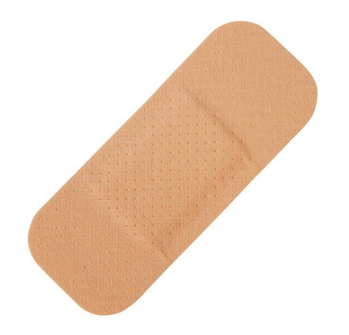Advent - Day 16
-
 December 16, 2024This morning, I opened my unique Advent calendar to find a small bandage. My first thought was, “Yuck! No one wants to find a used band-aid.” Thankfully, it was unused—but not one of the cool kinds with Bluey or Marvel Avengers characters, just your standard Johnson & Johnson Flexible Fabric Band-Aid. But as I held it, the symbolism began to sink in. A bandage represents healing—a first step in the journey toward wholeness and readiness for Christ.
December 16, 2024This morning, I opened my unique Advent calendar to find a small bandage. My first thought was, “Yuck! No one wants to find a used band-aid.” Thankfully, it was unused—but not one of the cool kinds with Bluey or Marvel Avengers characters, just your standard Johnson & Johnson Flexible Fabric Band-Aid. But as I held it, the symbolism began to sink in. A bandage represents healing—a first step in the journey toward wholeness and readiness for Christ.
In a way, a band-aid is a perfect symbol for this stage of Advent. In the first reading, Balaam catches a glimpse of the star rising from Jacob, a vision of hope. So often, we too catch only faint glimpses of the healing and peace Christ offers. But even these glimpses inspire hope and remind us of our deep need for spiritual healing. Yet, Advent calls us to go further—not just to cope or survive another day with physical, emotional, or even spiritual band-aids, but to seek true, lasting, total healing. Advent bids us prepare for Christ to transform us, to heal us wholly and completely.Healing Requires Humility and Change
In today’s Gospel, the chief priests and elders resist Jesus’ authority, unwilling to confront the truth He reveals. Their pride and fear of change prevent them from experiencing the healing and freedom He offers. How often are we like them?
Sometimes, it’s easier to live with the spiritual equivalent of a bandage, content to cover up our wounds rather than address their root causes. Real healing requires humility—it demands that we admit our brokenness and entrust it to God. It also requires change, often the most challenging part of the process. But imagine if we had to wear every bandage we ever needed throughout our lives. How strange and burdened we would look! Bandages are meant to be temporary. Christ offers more than survival or coping—He offers true, lasting healing.
This is the great promise of Advent: Jesus does not come merely to help us get by, but to make us whole. Through His authority, He offers complete restoration—a healing of mind, body, and soul that draws us into deeper communion with Him. For this to happen, we must first stop the habits and sins that hurt us, requiring so many bandages. Then, we must surrender to Christ’s authority and allow His healing grace to work within us.The Light is On for You
Advent is the perfect time to respond to Christ’s call to healing, and confession is one of the most powerful ways to do so. Throughout the Diocese of Portland this week, “The Light is On for You” provides extended times for confession. In Augusta, St. Mary’s Church will be open from 6–7 PM Monday through Friday for this sacrament of reconciliation. If this isn’t convenient, you can check the diocese website to find a parish near you: [Light is On - Advent | Diocese of Portland](https://portlanddiocese.org/light-advent).
“The Light is On for You” is your invitation to remove the spiritual bandages you’ve been holding onto. Let Christ’s mercy touch the places in your life that most need healing. Confession is not about shame or judgment—it’s about liberation and renewal. It’s the place where Christ binds up our wounds and sets us free.Trust the Divine Healer
This week, let the bandage inspire you to take concrete steps toward healing in your life. Here are some reflections and actions to guide you:
1. **Let Go of Fear**: What wounds are you hesitant to expose to Christ? Bring them to Him in prayer or confession, trusting in His gentle and merciful touch.
2. **Seek Reconciliation**: Is there a relationship in need of repair? Take a step toward forgiveness and healing.
3. **Pray for Healing**: Ask God to reveal the areas of your heart that need transformation and to give you the grace to embrace change.
As we journey through this third week of Advent, remember that Christ came not just to ease our burdens but to heal them completely. Open your heart to His healing authority, and let Him replace your bandages with the fullness of His grace. Together, let us walk toward Christmas with renewed hope and joy. Amen.